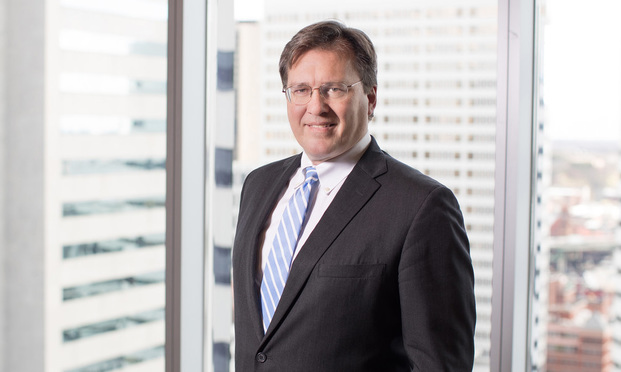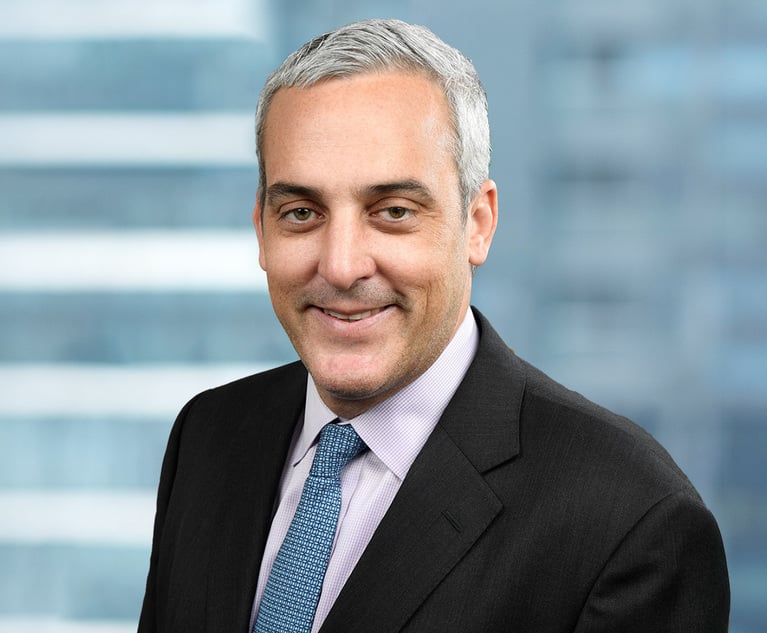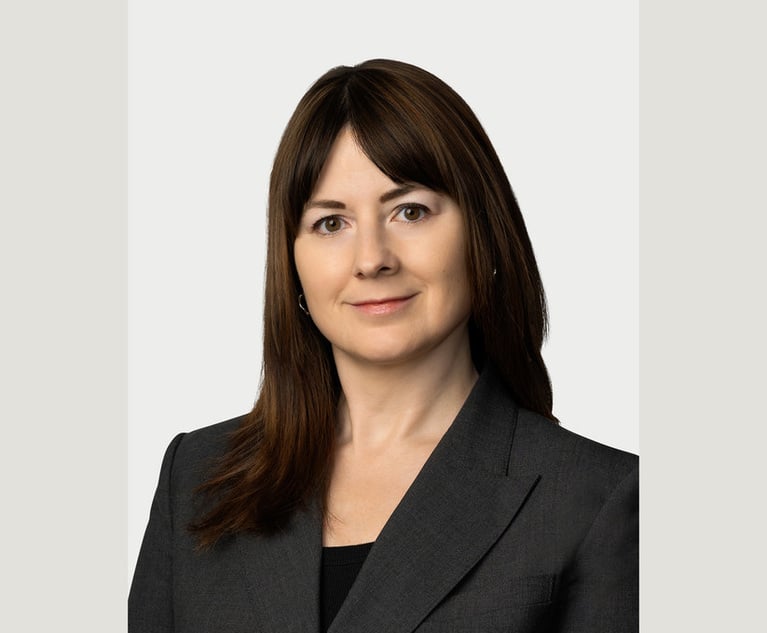McGuireWoods
As lawyers we have a critical and unique responsibility to ensure access to justice for others. Unfortunately, that access is scarce or unavailable for those of limited means. Without pro bono work, these individuals would not know justice.
April 30, 2019 at 11:59 PM
3 minute read
 Scott Oostdyk, with McGuireWoods.
Scott Oostdyk, with McGuireWoods.
Describe your firm's philosophy on pro bono service.
McGuireWoods looks to take on transformative issues in its pro bono work, but the primary objective of that work is to help people facing life-changing circumstances who lack the resources to hire lawyers overcome challenges. If that results in a U.S. Supreme Court victory that changes public policy, a record-setting judgment or a better way to battle homelessness, that's just an additional benefit of doing good for our communities.
Of the big cases your firm recently worked on, you represented a human trafficking victim who was introduced into a cult at age 2. Tell us more about that case and how you reached the outcome.
Betsy Hutson met Kendra Ross in 2015 through an aftercare shelter for human trafficking survivors. Over the course of the following two years, Betsy worked to earn Kendra's trust and discuss the possibility of filing a lawsuit against the regimented cult and its leader, Royall Jenkins, who forced Kendra to work without pay, benefits or breaks for over a decade. In 2017, a dedicated team of McGuireWoods' attorneys filed a complaint on behalf of Kendra and helped her navigate the difficult steps of litigation. In May 2018, Kendra was awarded nearly $8 million—the largest civil single-plaintiff trafficking award in U.S. history. The court's opinion provides invaluable precedent for other trafficking survivors seeking justice.
What was the most satisfying aspect of that key case?
The most satisfying part of Kendra's case was the evidentiary hearing in Kansas in February 2018. Kendra had the incredible courage to return to the epicenter of the cult, take the stand in open court, and testify against her traffickers. After the hearing, the judge walked down from the bench, shook Kendra's hand, expressed sincere compassion toward her, and said it was a true honor and privilege to meet her.
Discuss other key pro bono matters recently completed by the firm.
The firm won a Fourth Amendment case at the U.S. Supreme Court, with the high court ruling that police officers without a warrant cannot use the automobile exception to enter a home's curtilage to access a vehicle. The decision changed the way police nationwide are trained to conduct searches. Partner and appellate practice co-chair Matt Fitzgerald led the pro bono McGuireWoods team (all under age 35), which included two former U.S. Supreme Court clerks. Additionally, McGuireWoods helped establish "Charlotte Triage," in which firm lawyers and corporate general counsel help Charlotte, North Carolina, legal aid providers help underprivileged clients fight evictions, open doors for employment and housing, and preserve access to health care.
Why does your pro bono work matter to you as a lawyer?
As lawyers we have a critical and unique responsibility to ensure access to justice for others. Unfortunately, that access is scarce or unavailable for those of limited means. Without pro bono work, these individuals would not know justice. Performing pro bono work at the firm confirms our commitment to making justice available for as many people as we can, regardless of their ability to pay us.
Responses submitted by Scott Oostdyk, a litigation partner at McGuireWoods.
This content has been archived. It is available through our partners, LexisNexis® and Bloomberg Law.
To view this content, please continue to their sites.
Not a Lexis Subscriber?
Subscribe Now
Not a Bloomberg Law Subscriber?
Subscribe Now
NOT FOR REPRINT
© 2025 ALM Global, LLC, All Rights Reserved. Request academic re-use from www.copyright.com. All other uses, submit a request to [email protected]. For more information visit Asset & Logo Licensing.
You Might Like
View All
GOP Now Holds FTC Gavel, but Dems Signal They'll Be a Rowdy Minority
6 minute read
Fired by Trump, EEOC's First Blind GC Lands at Nonprofit Targeting Abuses of Power
3 minute read
Latham Adds Former Treasury Department Lawyer for Cross-Border Deal Guidance
2 minute readTrending Stories
- 1Latham's Lateral Hiring Picks Up Steam, With Firm Adding Simpson Practice Head, Private Equity GC
- 2Legal Restrictions Governing Artificial Intelligence in the Workplace
- 3Failure to Adequately Inform Patients
- 4'FTX' One Year Later: The Impact on Examiner Practice in Bankruptcy Courts
- 5Gen AI Legal Contract Startup Ivo Announces $16 Million Series A Funding Round
Who Got The Work
J. Brugh Lower of Gibbons has entered an appearance for industrial equipment supplier Devco Corporation in a pending trademark infringement lawsuit. The suit, accusing the defendant of selling knock-off Graco products, was filed Dec. 18 in New Jersey District Court by Rivkin Radler on behalf of Graco Inc. and Graco Minnesota. The case, assigned to U.S. District Judge Zahid N. Quraishi, is 3:24-cv-11294, Graco Inc. et al v. Devco Corporation.
Who Got The Work
Rebecca Maller-Stein and Kent A. Yalowitz of Arnold & Porter Kaye Scholer have entered their appearances for Hanaco Venture Capital and its executives, Lior Prosor and David Frankel, in a pending securities lawsuit. The action, filed on Dec. 24 in New York Southern District Court by Zell, Aron & Co. on behalf of Goldeneye Advisors, accuses the defendants of negligently and fraudulently managing the plaintiff's $1 million investment. The case, assigned to U.S. District Judge Vernon S. Broderick, is 1:24-cv-09918, Goldeneye Advisors, LLC v. Hanaco Venture Capital, Ltd. et al.
Who Got The Work
Attorneys from A&O Shearman has stepped in as defense counsel for Toronto-Dominion Bank and other defendants in a pending securities class action. The suit, filed Dec. 11 in New York Southern District Court by Bleichmar Fonti & Auld, accuses the defendants of concealing the bank's 'pervasive' deficiencies in regards to its compliance with the Bank Secrecy Act and the quality of its anti-money laundering controls. The case, assigned to U.S. District Judge Arun Subramanian, is 1:24-cv-09445, Gonzalez v. The Toronto-Dominion Bank et al.
Who Got The Work
Crown Castle International, a Pennsylvania company providing shared communications infrastructure, has turned to Luke D. Wolf of Gordon Rees Scully Mansukhani to fend off a pending breach-of-contract lawsuit. The court action, filed Nov. 25 in Michigan Eastern District Court by Hooper Hathaway PC on behalf of The Town Residences LLC, accuses Crown Castle of failing to transfer approximately $30,000 in utility payments from T-Mobile in breach of a roof-top lease and assignment agreement. The case, assigned to U.S. District Judge Susan K. Declercq, is 2:24-cv-13131, The Town Residences LLC v. T-Mobile US, Inc. et al.
Who Got The Work
Wilfred P. Coronato and Daniel M. Schwartz of McCarter & English have stepped in as defense counsel to Electrolux Home Products Inc. in a pending product liability lawsuit. The court action, filed Nov. 26 in New York Eastern District Court by Poulos Lopiccolo PC and Nagel Rice LLP on behalf of David Stern, alleges that the defendant's refrigerators’ drawers and shelving repeatedly break and fall apart within months after purchase. The case, assigned to U.S. District Judge Joan M. Azrack, is 2:24-cv-08204, Stern v. Electrolux Home Products, Inc.
Featured Firms
Law Offices of Gary Martin Hays & Associates, P.C.
(470) 294-1674
Law Offices of Mark E. Salomone
(857) 444-6468
Smith & Hassler
(713) 739-1250









